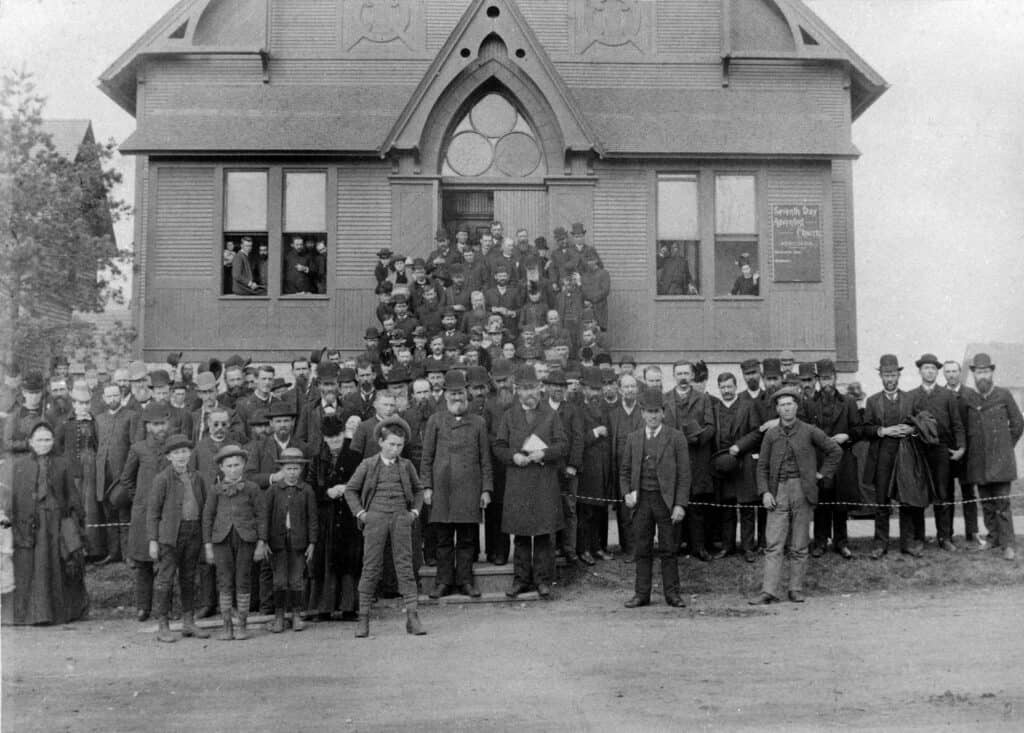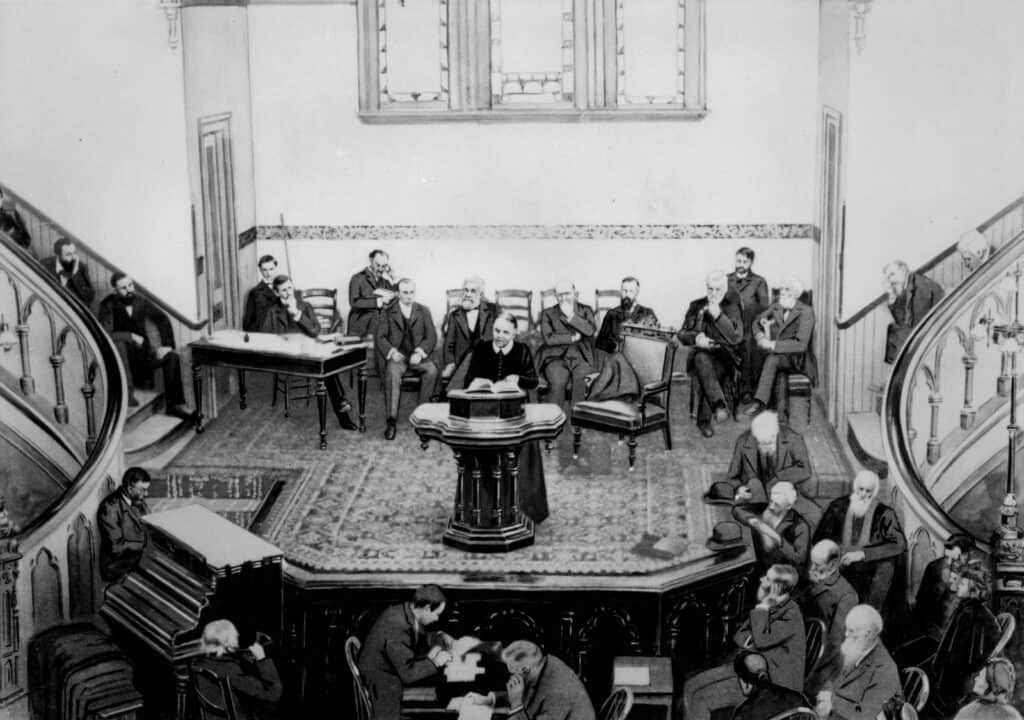As a highly influential author and founder of the Seventh-day Adventist Church, Ellen G. White’s spoken and written words were held in high regard by the denomination’s members. Because of her significant influence, however, White was careful never to let her writings take priority over the Holy Scriptures. She pointed out that “the Bible alone, is our rule of faith.”((White, Ellen G., Counsels on Sabbath School Work, p. 84 ))

I exalt the precious Word before you today. Do not repeat what I have said, saying, ‘Sister White said this,’ and ‘Sister White said that.’ Find out what the Lord God of Israel says, and then do what He commands.((White, Ellen G., Selected Messages, Book 3, p. 33 ))
She was adamant that the Bible must be used to support every belief of the Advent movement. This was noteworthy because in the 19th century, it was still common for people to rely on clergy to interpret Scripture. Instead of studying the Bible for themselves, people followed church traditions or whichever message they heard in the most recent sermon.
So let’s look at the ways she kept her fellow Christians pointed toward Christ and God’s Word.
- Using her publishing ministry
- Addressing and encouraging church leadership
- During the early days and formation of the Adventist Church
How Ellen White’s publishing ministry upheld the Bible
The Word of God was the central theme of Ellen White’s writings. She encouraged people to apply biblical principles to their daily life. Everything she wrote had three main goals:((http://www.atcunion.org/blog/files/8d1e113c01deafe011e6e5563959f03d-166.html ))
- Point people back to the Bible, especially in common situations where it was especially tempting for people to stray from Scripture
- Encourage people to be obedient to God’s Word
- Prepare people for the final days of earth’s history, educating them on what the Bible lays out for us so we don’t have to be afraid
In 1848, Ellen and her husband James were convicted to print a magazine called Present Truth. They distributed this magazine to Adventists everywhere((https://www.adventist.org/who-are-seventh-day-adventists/history-of-seventh-day-adventists/ )). It allowed them to discuss important points of theology even when they couldn’t all meet together.
The phrase “present truth” came from this Bible verse:
For this reason I will not be negligent to remind you always of these things, though you know and are established in the present truth.
2 Peter 1:2 (NKJV)
James and Ellen’s dedication eventually led to Adventist publishing houses around the world. They used the written word to share the Good News. Evangelistic literature was printed and shared by those in the Adventist movement.
Of the publishing work, Ellen said:
“Now is our time to work with vigilance. Our books and papers are to be brought before the notice of the people; the gospel of present truth is to be given to our cities without delay. We need to arouse to our duties. If we are making the life and teachings of Christ our study, every passing event will furnish a text for an impressive lesson.”((White, Ellen G., A Call to Service in the Master’s Harvest Field, p. 4 ))
We are to make opportunities for presenting the truth. Christians are to be workers together with Christ. They are to engage in many lines of evangelistic work.((Ibid.))
Ellen’s first book was published in 1851. It was a work of 64 pages titled, A Sketch of the Christian Experience and Views of Ellen G. White. She wrote:
I recommend to you, dear reader, the word of God as the rule of your faith and practice. By that Word we are to be judged. God has, in that Word, promised to give visions in the ‘last days;’ not for a new rule of faith, but for the comfort of His people, and to correct those who err from Bible truth.((A Sketch of the Christian Experience and View of Ellen G. White, p. 64 ))

It was her intention to point people to the Word of God and Biblical truth. She felt strongly that God had called her to share the message that He would return to earth, literally, to redeem us and take us to Heaven with Him—just as He talked about in John 14:1-4. She wanted people to be ready to meet their precious Savior.
So it is today. Men are rushing on in the chase for gain and selfish indulgence as if there were no God, no heaven, and no hereafter. In Noah’s day the warning of the flood was sent to startle men in their wickedness and call them to repentance. So the message of Christ’s soon coming is designed to arouse men from their absorption in worldly things. It is intended to awaken them to a sense of eternal realities, that they may give heed to the invitation to the Lord’s table.((White, Ellen G., Christ’s Object Lessons, p. 228 ))
Ellen wrote the book titled The Great Controversy in 1858, all about the spiritual war between good and evil that engulfs our world. She received special insight from God about how this biblical story would unfold throughout history.
The story begins with the war in heaven, detailing events throughout religious history until the end of time. As history comes to a close, Christ’s followers are taken to heaven with Him at the second advent. The story ends when heaven and earth are made new, as found in Revelation chapter 21.
In The Great Controversy, we continue to find Ellen White emphasizing the authority of the Bible:
In His word, God has committed to men the knowledge necessary for salvation. The Holy Scriptures are to be accepted as an authoritative, infallible revelation of His will. They are the standard of character, the revealer of doctrines, and the test of experience.((White, Ellen G., The Great Controversy, p. vii ))
(The Great Controversy was updated and reprinted in 1991. That version is now included in a five-volume Conflict of the Ages set.)
Encouraging Church Leadership to Hold Fast to the Bible’s Instruction
As Adventism set its roots firmly in the ground, Ellen White inspired followers of Christ to cling to the Word of God. She used her prophetic gift to point fellow Christians back to the Bible, should they be tempted to stray.

Cling close to your Bible, for its sacred truths can purify, ennoble and sanctify the soul. You must hold the truth and teach it as it is in Jesus, else it is of no value to you. Before the light of God’s truth let human opinions and ideas and human wisdom appear as they are in the sight of God—as foolishness.((White, Ellen G., Christian Leadership, p. 30 ))
She frequently reminded everyone to study God’s Word, the Bible. It was evident that she treasured the words written in Scripture and knew we needed to hold these truths in our hearts at all times.
The Bible is of the highest value because it is the word of the living God. Of all the books in the world it is the most deserving of study and attention, for it is eternal wisdom. … It reveals to us the Creator of the heavens and the earth, with the universe that He has brought into being, and it sheds a glorious light over the world to come.((White, Ellen G., Counsels to Parents, Teachers, and Students, p. 421 ))
In comparison, she believed her own writings were to serve the role of leading people toward the Bible. Though at times, she noticed various church members or leaders would pass along her words instead of the Scripture to which they were calling attention. This concerned her, as she never meant her testimonies to replace or supersede the Bible.
Of her own writings, she said:
The Spirit was not given—nor can it ever be bestowed—to supersede the Bible; for the Scriptures explicitly state that the word of God is the standard by which all teaching and experience must be tested.
Says the apostle John, ‘Believe not every spirit, but try the spirits whether they are of God: because many false prophets are gone out into the world’ [1 John 4:1]. And Isaiah declares, ‘To the law and to the testimony: if they speak not according to this word, it is because there is no light in them’ [Isaiah 8:20].((White, Ellen G., Counsels for the Church, p. 92 ))
I took the precious Bible and surrounded it with the several Testimonies for the Church, given for the people of God. Here, said I, the cases of nearly all are met. The sins they are to shun are pointed out. The counsel that they desire can be found here, given for other cases situated similarly to themselves. God has been pleased to give you line upon line and precept upon precept.((Ibid. ))
And if she noticed that fellow believers were neglecting to follow the Bible, she was not afraid to confront them. She said the messages she received from her prayerful relationship with God were given to her for times when people had forgotten the Bible’s words and needed a reminder.
She believed her writings to be a “lesser light” pointing to the “greater light.”((White, Ellen G., A Call to Stand Apart, p. 68 )) And she understood the Bible to be the “greater light,” or ultimate authority.
What book can compare with the Bible? An understanding of its teachings is essential for every child and youth, and for those of mature age; for it is the word of God, given to guide the human family to heaven. In the world today there are gods many and doctrines many. Without an understanding of the Scriptures it is impossible for the youth to understand what is truth, or to discern between the sacred and the common.((Ibid., p. 69 ))
One of the most popular books written by Ellen White, The Desire of Ages, offers a beautiful depiction of the life, death, and resurrection of Jesus Christ.
The plan of salvation is looked at through the lens of the four gospels, Matthew, Mark, Luke, and John. And through her beautiful words, we can see how much she loved the Bible and wished everyone turned to the Scriptures for truth.
On page 459 of The Desire of Ages she says:
Whoever will prayerfully study the Bible, desiring to know the truth, that he may obey it, will receive divine enlightenment. He will understand the Scriptures.
This echoes what is said in John 7:17: “If anyone’s will is to do God’s will, he will know whether the teaching is from God or whether I am speaking on my own authority” (ESV).
Later, on page 671, she wrote:
Through the Scriptures the Holy Spirit speaks to the mind, and impresses truth upon the heart. Thus, He exposes error, and expels it from the soul. It is by the Spirit of truth, working through the word of God, that Christ subdues His chosen people to Himself.
Through her gift of prophecy, Ellen White held the Bible in the highest esteem. Wherever she spoke and whatever she wrote, her words demonstrated a deep love for God’s will and a commitment to be led by the Holy Spirit.
He [Christ] pointed to the Scriptures as the unquestionable authority, and we should do the same.((White, Ellen G., Christ’s Object Lessons, p. 39 ))
Influence and Leadership in Early Seventh-day Adventism
The Seventh-day Adventist Church became an official denomination in May 1863. Delegates representing many congregations met together for what is now known as the General Conference of Seventh-day Adventists. Their united purpose was to share “how a deeper understanding of Scripture not only prepares us for eternity with Christ, but for living more abundant lives in the here and now.”((https://www.adventist.org/who-are-seventh-day-adventists/united-for-mission-one-hundred-and-fifty-years/ ))

As the Seventh-day Adventist Church grew, Ellen White continued to remind the church leaders to keep studying and reviewing the Word of God. She wanted people to understand it was the words of the Bible that needed to be “written on their hearts” (Romans 2:15, ESV).
From the early advent movement to the formation of the Seventh-day Adventist Church, and into her later years, she consistently proclaimed that the Bible was to be the only true authority. Or, in her words, “All human teaching should be subordinate to the oracles of God.”((White, Ellen G., The Great Controversy, p. 203 ))
Seventh-day Adventists today still hold to that same principle. Simply put, Adventists’ 28 fundamental beliefs are based on Scripture and Scripture alone. Their purpose is to describe how the denomination interprets and applies these key scriptural principles.
At the 1909 General Conference Session, she spoke her last words to the leaders of the church. W.A. Spicer, secretary of the General Conference at the time, recorded her bold, straightforward demonstration:
She moved away from the desk and started to her seat, then turned and came back, picked up the Bible from which she had read, opened it, and held it out on extended hands that trembled with age. She admonished, ‘Brethren and Sisters, I commend unto you this Book.((Spicer, William A., The Spirit of Prophecy in the Advent Movement, p. 30 ))

And she certainly made her point. We must begin and end with God’s Word.